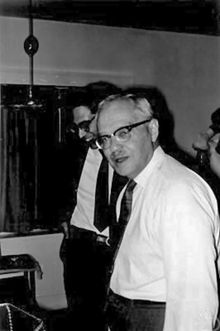
Back جيرزي نيمان Arabic جيرزى نيمان ARZ جرزی نیمن AZB Jerzy Neyman Catalan Jerzy Neyman Czech Jerzy Neyman German Γέζι Νέιμαν Greek Jerzy Neyman Spanish Jerzy Neyman Basque جرزی نیمن Persian
Jerzy Neyman | |
|---|---|
 | |
| Born | Jerzy Spława-Neyman April 16, 1894 |
| Died | August 5, 1981 (aged 87) Oakland, California, US |
| Nationality | Polish |
| Alma mater | University of Warsaw Kharkov University |
| Known for | Neyman construction Neyman–Pearson lemma Neyman–Rubin causal model Fisher–Neyman factorization theorem Confidence interval Hypothesis testing Statistics of galaxy clusters |
| Awards | Newcomb Cleveland Prize (1958) Guy Medal (Gold, 1966) National Medal of Science (1968) Fellow of the Royal Society[1] |
| Scientific career | |
| Fields | Mathematics |
| Institutions | Nencki Institute of Experimental Biology University College London University of California, Berkeley |
| Doctoral advisor | Wacław Sierpiński |
| Doctoral students | George Dantzig Lucien Le Cam Evelyn Fix Erich Leo Lehmann Joseph Hodges Pao-Lu Hsu |
Jerzy Neyman (April 16, 1894 – August 5, 1981; born Jerzy Spława-Neyman; Polish: [ˈjɛʐɨ ˈspwava ˈnɛjman]) was a Polish mathematician and statistician who first introduced the modern concept of a confidence interval into statistical hypothesis testing[2] and revised Ronald Fisher's null hypothesis testing with Egon Pearson. Neyman spent the first part of his professional career at various institutions in Warsaw, Poland and then at University College London, and the second part at the University of California, Berkeley.
- ^ Kendall, D. G.; Bartlett, M. S.; Page, T. L. (1982). "Jerzy Neyman. 16 April 1894-5 August 1981". Biographical Memoirs of Fellows of the Royal Society. 28: 379–412. doi:10.1098/rsbm.1982.0015. JSTOR 769904.
- ^ Salsburg, David (2002). The Lady Tasting Tea: How Statistics Revolutionized Science in the Twentieth Century. Macmillan. p. 122. ISBN 9780805071344.
© MMXXIII Rich X Search. We shall prevail. All rights reserved. Rich X Search